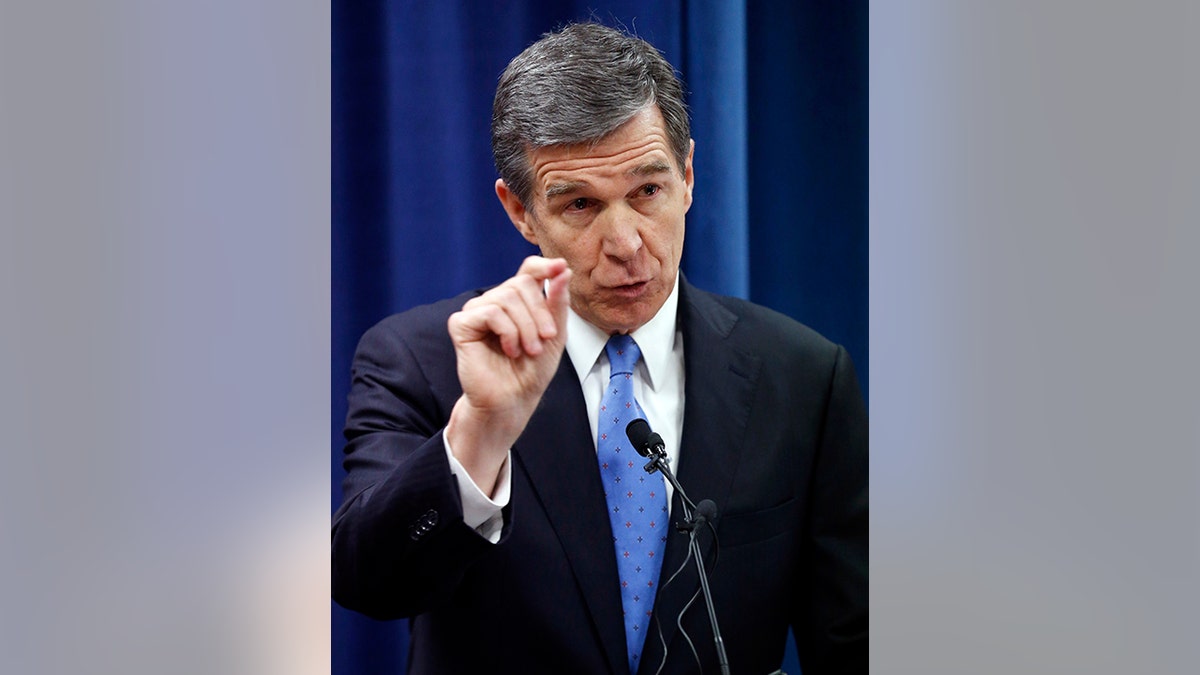
North Carolina Gov. Roy Cooper vetoed voter ID legislation that more than 55 percent of the state’s voters had approved in a referendum. (Chris Seward/The News & Observer via AP)
Republican leaders in North Carolina’s GOP-dominated General Assembly vowed late Friday to override Democratic Gov. Roy Cooper’s veto of a state voter identification bill.
Earlier Friday, Cooper said no to the legislation, which more than 55 percent of the state’s voters had approved in a recent referendum.
The referendum called for the state’s constitution to add an amendment requiring in-person voter photo ID.
“Requiring photo IDs for in-person voting is a solution in search of a problem,” Cooper said in a statement.
But state Republicans saw the governor’s action as a rejection of the will of state residents.
“We are disappointed that Gov. Cooper chose to ignore the will of the people and reject a commonsense election integrity measure that is common in most states, but the North Carolina House will override his veto as soon as possible,” state House Speaker Tim Moore said in a statement.
"We are disappointed that Gov. Cooper chose to ignore the will of the people and reject a commonsense election integrity measure that is common in most states."
“Despite the governor's personal feelings on voter ID, the fact remains that the constitutional amendment passed with a broad mandate from North Carolinians," GOP Senate leader Phil Berger added, calling Cooper's arguments a “tired rehash of unconvincing talking points rejected by the voters.”
Republicans hold veto-proof majorities in both the House and Senate in North Carolina, so an override would succeed if GOP lawmakers remain united on the issue. Votes could occur next week. GOP lawmakers are acting now because, come January, they will no longer have supermajorities because of Democratic gains made on Election Day.
The bill would expand the number of qualifying forms of ID and exceptions compared to legislation blocked earlier this decade. Republicans say the changes will ensure that everyone lawfully registered to vote can cast a ballot.
Permitted IDs would include traditional driver's licenses and military identification, student IDs from colleges and universities, and employee ID cards for state and local governments. Those IDs must meet certain security thresholds.
There also would be a new, free, photo voter identification card produced by county election boards. People having trouble obtaining an ID could fill out forms at the polling site, and their ballots likely would be counted too.
Democratic legislators acknowledge that voter ID rules are necessary because of the referendum, but they say the details are being rushed, are complex and will prevent some minorities and poor people from voting.
Cooper’s veto came at the urging of groups such as the American Civil Liberties Union, Common Cause NC, Equality NC and the Washington-based Campus Vote Project of the Fair Elections Center, the News & Observer of Raleigh reported.
The governor suggested that the integrity of absentee ballots was a greater concern for the state.
"Instead, the real election problem is votes harvested illegally through absentee ballots, which this proposal fails to fix," he said, referencing an investigation of alleged absentee ballot fraud in the state's 9th Congressional District in November's election.
He added that the bill's fundamental flaw was a "sinister and cynical" attempt to suppress the voting rights of minorities, the poor, and the elderly.
Federal judges struck down a 2013 state law that included photo ID and other voting restrictions, ruling they were approved with intentional racial discrimination in mind. Republicans strongly disagreed and put a constitutional amendment on the November ballot to give them more legal and popular standing to require voter ID.
The Associated Press contributed to this story.



